Miracle In Milan
Introduction
Another of Vittorio de Sica`s `neorealist` offerings (except it isn`t really) this time from 1951.
A baby is discovered in a cabbage patch by an old woman. Naming him Totò (we presume - as that`s what he is called throughout the latter parts of the film), she brings hm up as her own.
Unfortunately, the old woman dies, most likely being bored to death by her doctors, and Totò is taken to an orphanage until he is deemed old enough to look after himself in post-war Milan.
He leaves the orphanage full of hope for the future, with cheery greetings to anyone he comes across, and the sort of outlook on life that really makes you want to slap him.
He begins his new life amongst the poorest of Italian society, and slowly transforms their existence into one which may be worth living, despite the interest of some rich people who want to buy the land.
Oil is discovered within the newly-built shanty town, the rich come swarming back with the police for a forced eviction..and then things just become very peculiar.
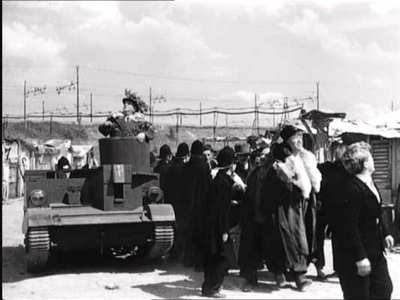
Video
Video quality is quite disappointing, although if there has been any remastering, then I would have hated to see the original print. Having said this, there is nothing so bad as to be unwatchable, and the flying effects at the end are quite effective - giving a great view over Milan Cathedral (apparently disapproved of by those in charge at the time).
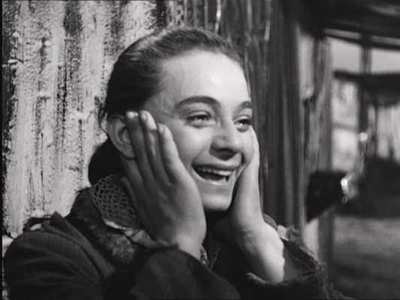
Audio
The mono soundtrack to the film is clear enough, but not quite as good as that within de Sica`s earlier `Bicicle Thieves`. The music, again written by Alessandro Cicognini, acts as a perfect accompaniment to much of the film, but to reflect the constant cheeriness of the film`s hero, is constantly happy, even over the sad moments.
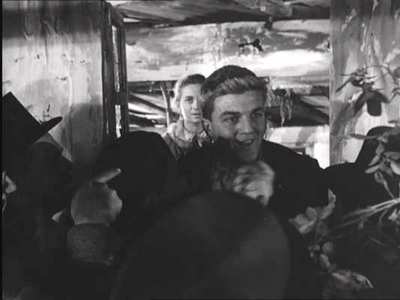
Features
Extras include two short interviews with the director`s son and Brunella Bovo, who plays Edvige. We learn much more from Manuel de Sica, for example that the `realist` element extended to using real Milanese alcoholics as extras, who had to be woken up before shots by having a bucket of cold water thrown over them.
We also have the same trailer for de Sica`s films which can also be seen on `The Bicycle Thieves`
And of course, English subtitles.
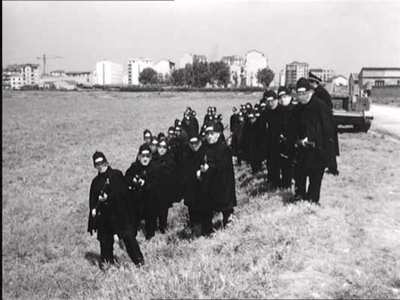
Conclusion
The opening title of `Once upon time…` makes you suspect that we may be getting a little more than just `neorealism` within this film. de Sica makes it perfectly clear throughout that he is creating some sort of fable about the gap between rich and poor but it`s a shame that the message being forced upon us is so crudely depicted.
The poor are obviously so miserable purely because of the rich capitalists and in the extras, we are told that the original title of the film was to have been `The Poor are a Disturbance`, which tells us quite a bit.
The rich are depicted as obscene caricatures - visiting the opera, wearing furs and top hats and smoking huge cigars. They are applauded when they appear, and they graciously acknowledge (sometimes) those who obviously admire them for their wealth.
The poor are of course only human, and so when they discover the oil, and a miraculous white dove delivered by Totò`s dead `mother` (and which can grant any wish) become as greedy as the capitalists who are trying to exploit them.
Despite the simplistic plot, there are some wonderful moments in this film. de Sica adds some great comic touches which had me laughing out loud on occasion, and Francesco Golisano smiles throughout the film like a trooper. I never quite understood the insistence on teaching everyone their times-tables though.
Manuel de Sica (in the interview on the disc) says that there were ideas the final scene should show the poor riding their broomsticks around the Earth for ever, as the whole planet was covered with `Private Property` signs. I think this would have made a much better ending to the one we see, where the poor ride upwards on their brooms "Towards a kingdom where `Good morning` really means `Good morning!`...and leaves us with a `What was that all about then?` feeling
And that`s it really - it seems the messages are :
Money brings corruption.
We should all be happy with the simple things in life.
Private property is essentially wrong
If you are polite to all, and say `Good morning`, then life will turn out for the better.
..and one more rather disturbing message which appears to say that you cannot form relationships unless you`re the same colour, but this is perhaps just a refection of the society at the time.
A very interesting film, and one which you can never accuse of lacking imagination but I`m not sure it`s as successful a satire as de Sica intends.
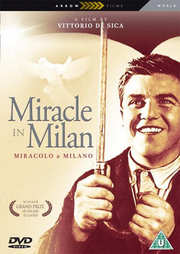




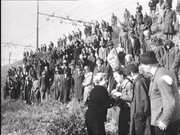
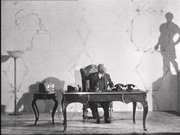
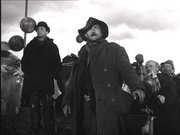
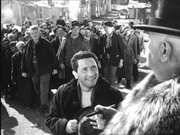
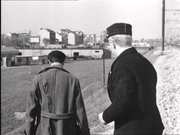
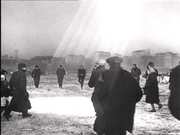
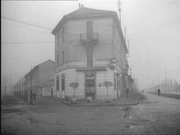
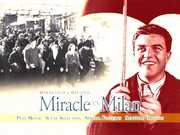
































Your Opinions and Comments
Be the first to post a comment!